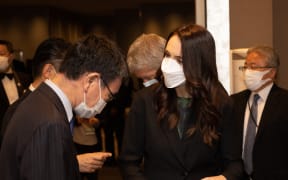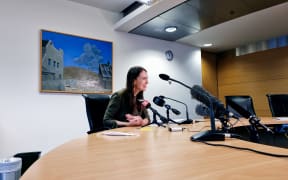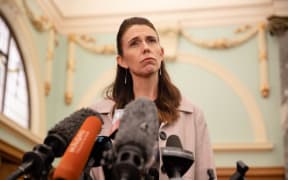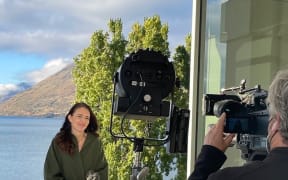The Prime Minister will leave for a trade mission to the United States tonight, but a White House visit has not yet been nailed down.
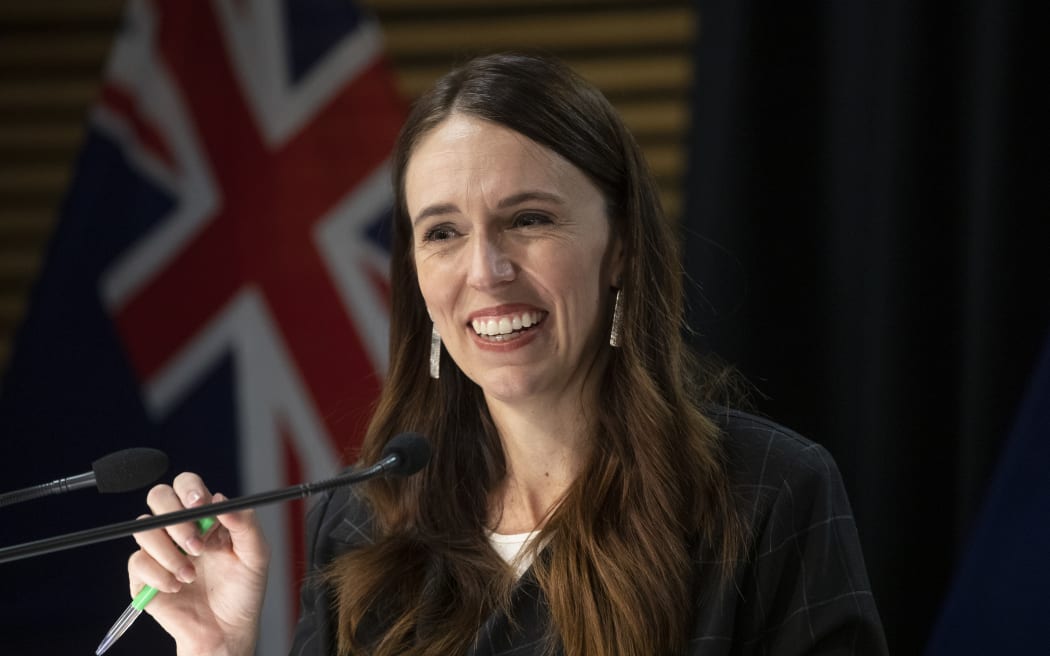
Jacinda Ardern. Photo: POOL/ NZME
The trip has been arranged around Jacinda Ardern's invitation to speak at Harvard's Commencement, and includes a range of trade, tourism, political and tech calls, as well as a second appearance on the Late Show.
It's been some time since a New Zealand Prime Minister has visited the White House, through the Trump years, and if it does go ahead, would be the first one since John Key last went in 2014 to meet with President Barack Obama.
Covid-19 as usual has caused complications, namely Ardern's positive result more than a week ago, where she caught the virus while isolating with her family - but there are still efforts under way to arrange a White House visit. Under CDC rules she cannot travel for a full 10 days after symptoms started, or after a positive test. That has led to her delayed departure later this evening and the cancellation of the first part of the programme in Los Angeles.
The trip was arranged around the prestigious invitation to be the principal speaker at Harvard's Commencement; it's also a chance to drum up more trade and tourism in the huge American market. The US is New Zealand's third largest trading partner with two-way trade worth $18.5 billion at the end of last year, and annual trade growth averaging about 5 percent over the past 15 years. Before the pandemic, Americans made up ten percent of New Zealand's tourist numbers.
In New York, Ardern will meet with United Nations Secretary-General, Antonio Guterres and appear for second time on the Late Show with Stephen Colbert. She will meet senior members of the Senate in Washington, then it's on to meetings with tech heavyweights - Twitter, Amazon, Web Services and Microsoft. They'll talk business, but it's also a timely opportunity for a follow-up on the Christchurch Call in the wake of the recent Buffalo shootings.
Ardern says while Covid has created more uncertainty, it hasn't "had a huge impact from the business delegation's perspective nor for our engagements around business and tourism".
"In these times, you roll with the Covid curveballs that you're thrown."
The US in the Indo-Pacific
Her trip comes at a time of great disruption and conflict, the invasion of Ukraine but also the strategic power play between the US and China. Even while dealing with Ukraine, the US says the Indo-Pacific is an area of high priority, and vital to its own "security and prosperity".
"I can't imagine a more important time for political engagement," Ardern says.
"You'll see the United States with engagement with new NATO applicants, the complete focus - not just on what the war in Ukraine means for the United States - but for the world."
However, there's still plenty going on in New Zealand's backyard; Ardern says it's happy to see the "re-engagement" of the US in the region, while the White House admits the US needs to "step up" its game.
What New Zealand has called for, Ardern says, is for the "return" of the US which has been "present force" in the region for a number of years.
"What we've seen in recent years though was a particular focus, perhaps to other domestic matters, or into other regions and slightly less of a presence in ours."
Joe Biden has just made his first visit to Asia as US President, and is preparing for a meeting of the Quad in Japan - an informal grouping alongside Australia, India and Japan, seen as part of US efforts to curtail China's influence. Australia, of course, has just elected a new Prime Minister, Labor's Anthony Albanese, who now looks like getting in ahead of Ardern to meet personally with President Biden.
Late last week China's foreign spokesperson cited comments from the US National Security Adviser Jake Sullivan that "President Biden's upcoming trip to Asia is not aimed at confronting China".
"We hope that the US will match its words with deeds and work with countries in the region to promote solidarity and cooperation in the Asia-Pacific, instead of plotting division and confrontation.
"It should join efforts to foster an open and inclusive "circle of friends" in the Asia-Pacific, instead of putting together a closed and exclusive "clique"," they said.
On China, there's a blunt assessment of the American view in the Indo-Pacific Strategy issued by the White House in February, referring to the challenges the region faces "particularly from the PRC [People's Republic of China]".
"The PRC is combining its economic, diplomatic, military, and technological might as it pursues a sphere of influence in the Indo-Pacific and seeks to become the world's most influential power.
"The PRC's coercion and aggression spans the globe, but it is most acute in the Indo-Pacific," it says.
"From the economic coercion of Australia to the conflict along the Line of Actual Control with India to the growing pressure on Taiwan and bullying of neighbors in the East and South China Seas, our allies and partners in the region bear much of the cost of the PRC's harmful behavior."
The US promises to work much more closely with the Pacific and regional partners and allies across a range of areas like climate change, maritime security and shoring up its military presence and capability.
Kurt Campbell is a senior White House official, the Coordinator for Indo-Pacific Affairs in the National Security Council.
Speaking in Washington earlier this month, he said in the past the US had concentrated a lot on other "theatres", but it's clear greater attention is needed in the Pacific.
"Several administrations in succession in the United States have tried this effort to launch more fundamental efforts, policies, frameworks in Asia, East Asia, Indo-Pacific and found themselves stymied or misdirected, or directed towards other pursuits."
"Although there are urgent and immediate tasks…in Ukraine…at the same time we recognise that the larger, more fundamental challenges lay in the Indo-Pacific region, Campbell said.
While the invasion of Ukraine is playing out on a different continent, Campbell said there had been an "unprecedented level of engagement" from Asian nations, not driven by the US but in an "indigenous" manner, swiftly imposing sanctions, "tangible military assistance" and humanitarian aid.
Ukraine had prompted a lot of "quiet strategic thinking" in the region, acting as "cautionary tale", should anything similar happen much closer to home.
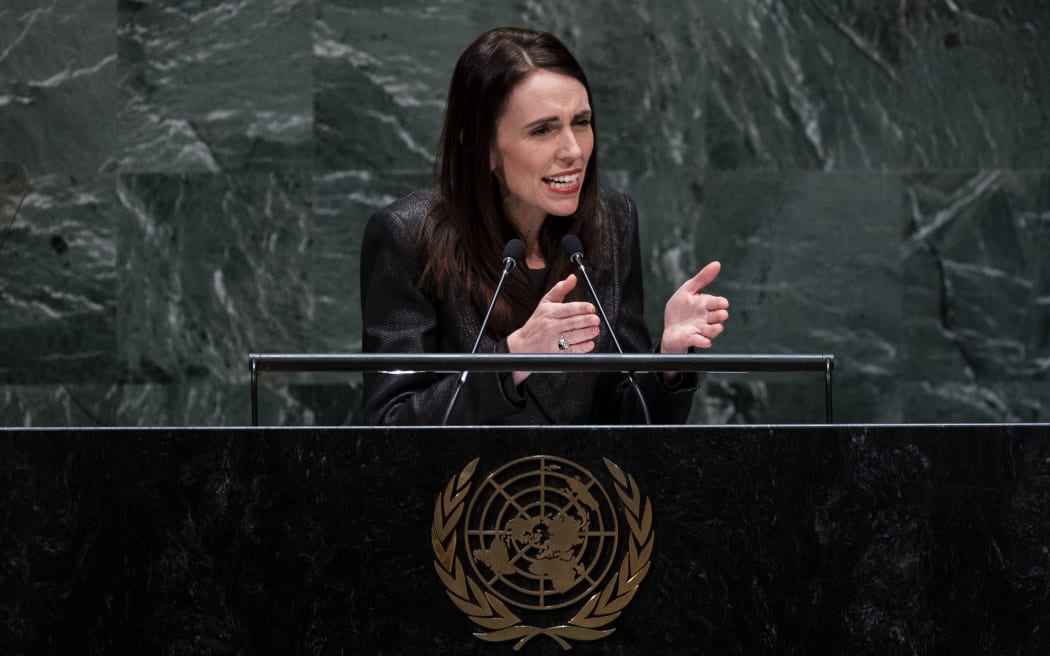
Ardern spoke at the United Nations in a pre-pandemic trip in 2018. Photo: AFP
Military might versus economic engagement
There are many threads to these global relationships; security and defence are important, as is trade. America pulled out of the Trans-Pacific Partnership trade deal under Donald Trump and no-one is holding their breath for a return under the Biden administration.
Amid criticisms the US has had too heavy a focus on security and defence, Biden is due to annoncement some details around the Indo-Pacific Economic Framework (IPEF) as part of his Asia trip. However that's based on binding regional countries through common standards rather than a commitment to lower tariffs; it works across a number of strategic areas like supply chain resilience, carbon reduction and the digital economy.
It is also widely seen as a means of regaining credibility and a counter to the economic influence of China, which is part of the largest trade deal in the world, the Regional Comprehensive Economic Partnership, and has applied to join the CPTPP.
Ardern says while there's an acknowledgement the U.S. has responded to the call for more economic engagement, that does not mean New Zealand will stop pushing for the Comprehensive and Progressive Trans-Pacific Partnership, or CPTPP, because that is "an existing framework that has a high quality agreement that sets a high standard that we know is beneficial to our exporters".
"The IPEF," she says, "as it's been floated…is not a traditional trade instrument and so there is still room for us to keep pushing the CPTPP in particular."

